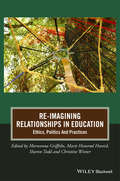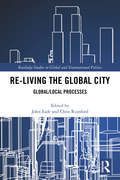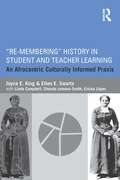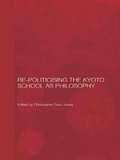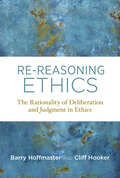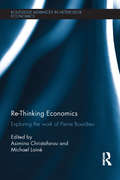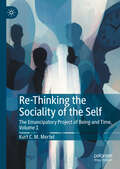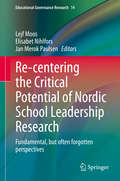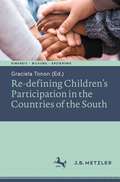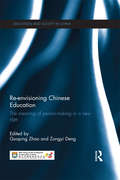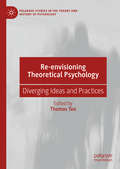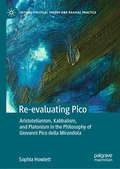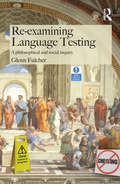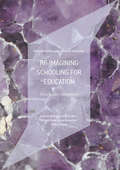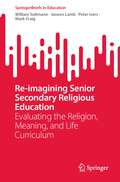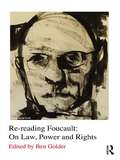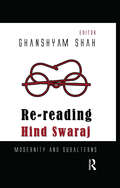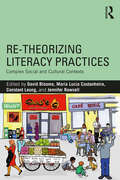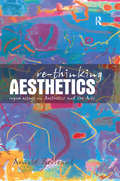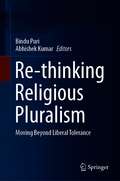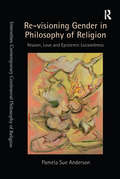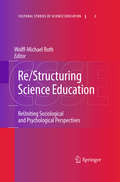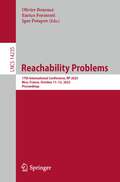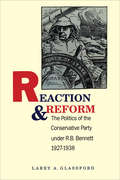- Table View
- List View
Re-Imagining Relationships in Education: Ethics, Politics and Practices (Journal of Philosophy of Education)
by Sharon Todd Morwenna Griffiths Marit Honerød Hoveid Christine WinterRe-Imagining Relationships in Education re-imagines relationships in contemporary education by bringing state-of-the-art theoretical and philosophical insights to bear on current teaching practices. Introduces theories based on various philosophical approaches into the realm of student teacher relationships Opens up innovative ways to think about teaching and new kinds of questions that can be raised Features a broad range of philosophical approaches that include Arendt, Beckett, Irigaray and Wollstonecraft to name but a few Includes contributors from Norway, England, Ireland, Scotland, Spain, Sweden, and the U.S.
Re-Living the Global City: Global/Local Processes (Routledge Studies in Global and Transnational Politics)
by John Eade Chris RumfordLiving the Global City (1996) was a landmark text in the field of Global Studies, offering an analysis of globalization and global/local processes by focussing on specific issues and themes which include community, culture, milieu, socioscapes and sociospheres, microglobalization, poverty, ethnic identity and carnival. In this new collection Eade and Rumford draw together scholars whose work has engaged with the original volume over the last 15 years and the result is a unique and thematically coherent collection of essays which both complements the original book and challenges some of its core assumptions. Re-Living the Global City both pays homage to a key text and pushes its agenda into important new areas. After reflecting upon how debates in the field have developed since the original publication, the contributors seek to drive the debate forward through discussion of contemporary themes and issues such as borders and bordering, social movements, community and global connectivity. They consider the ways in which the city produces different experiences of globalization for different people and examine the various accounts of the ways in which new forms of sociality are definitive of contemporary globalization and cosmopolitanism. Drawing together scholars from a range of disciplines including international relations, politics, sociology, urban studies and anthropology, this work will be of great interest to all students and scholars of global studies and globalization.
Re-Membering History in Student and Teacher Learning: An Afrocentric Culturally Informed Praxis
by Joyce E. King Ellen E. SwartzWhat kind of social studies knowledge can stimulate a critical and ethical dialog with the past and present? "Re-Membering" History in Student and Teacher Learning answers this question by explaining and illustrating a process of historical recovery that merges Afrocentric theory and principles of culturally informed curricular practice to reconnect multiple knowledge bases and experiences. In the case studies presented, K-12 practitioners, teacher educators, preservice teachers, and parents use this praxis to produce and then study the use of democratized student texts; they step outside of reproducing standard school experiences to engage in conscious inquiry about their shared present as a continuance of a shared past. This volume exemplifies not only why instructional materials—including most so-called multicultural materials—obstruct democratized knowledge, but also takes the next step to construct and then study how "re-membered" student texts can be used. Case study findings reveal improved student outcomes, enhanced relationships between teachers and families and teachers and students, and a closer connection for children and adults to their heritage.
Re-Politicising the Kyoto School as Philosophy (Routledge/Leiden Series in Modern East Asian Politics, History and Media)
by Christopher Goto-JonesIn Re-Politicising the Kyoto School as Philosophy Christopher Goto-Jones contends that existing approaches to the controversial Kyoto School fail to take it seriously as a school of philosophy, instead focussing on historical debates about the alleged complicity of the School’s members with the imperialist regime in Japan. The essays in this book take a new approach to the subject, engaging substantially with the philosophical texts of members of the Kyoto School, and demonstrating that the school developed serious and sophisticated positions on many of the perennial questions that lie at the heart of political philosophy. These positions are innovative and fresh, and are of value to political philosophy today, as well as to intellectual historians of Japan. In particular, the book is structured around the various ways in which we might locate the Kyoto School in mainstream traditions of political thought, and the insights offered by the School about the core concepts in political philosophy. In this way the book re-politicises the Kyoto School. With chapters written by many leading scholars in the field, and representing a contribution to political thought as well as the intellectual history of Japan, this book will appeal to students and scholars of Japanese studies, philosophy and political thought.
Re-Reasoning Ethics: The Rationality of Deliberation and Judgment in Ethics (Basic Bioethics)
by Barry Hoffmaster Cliff HookerHow developing a more expansive, non-formal conception of reason produces richer ethical understandings of human situations, explored and illustrated with many real examples.In Re-Reasoning Ethics, Barry Hoffmaster and Cliff Hooker enhance and empower ethics by adopting a non-formal paradigm of rational deliberation as intelligent problem-solving and a complementary non-formal paradigm of ethical deliberation as problem-solving design to promote human flourishing. The non-formal conception of reason produces broader and richer ethical understandings of human situations, not the simple, constrained depictions provided by moral theories and their logical applications in medical ethics and bioethics. Instead, it delivers and vindicates the moral judgment that complex, contextual, and dynamic situations require.Hoffmaster and Hooker demonstrate how this more expansive rationality operates with examples, first in science and then in ethics. Non-formal reason brings rationality not just to the empirical world of science but also to the empirical realities of human lives. Among the many real cases they present is that of how women at risk of having children with genetic conditions decide whether to try to become pregnant. These women do not apply the formal principle of maximizing expected utility (as advised by genetic counselors) and instead imagine scenarios of what their lives could be like with an affected child and assess whether they could accept the worst of these scenarios.Hoffmaster and Hooker explain how moral compromise and a liberated, extended, and enriched reflective equilibrium expand and augment rational ethical deliberation and how that deliberation can rationally design ethical practices, institutions, and policies.
Re-Thinking Economics: Exploring the Work of Pierre Bourdieu (Routledge Advances in Heterodox Economics)
by Asimina Christoforou Michael LainéOnce again, unfettered capitalism has failed. Promises for global prosperity and peace have given way to a world of deep recession, social upheaval and political instability. Once again, mainstream economics has proved its inadequacy. Despite its technical rigour and mathematical virtuosity, it failed dramatically to respond to the current crisis. Why is this so? Mainstream economics turns a blind eye to society. By assumption, it maims its analyses by wiping away what makes us what we are. There is pressing need for a critical discussion and new ideas. We therefore turn to the insightful and stimulating work of Pierre Bourdieu. Arguably one of the major sociologists ever, he was also a major ‘economist’. Yet his works on the economy have received only scant attention, especially from economists, be they ‘mainstream’ or ‘heterodox’. Bourdieu helps to take a broader view and enrich our scientific imagination. By including dimensions of power, intuitive behaviour and social structures within the scope of his analysis, he provides for an alternative foundation of economics, based on an integrated, interdisciplinary theory. For the first time, this volume fills this gap in economics by featuring state-of-the-art research and experts from different social science disciplines. This book constitutes a first step, and hopes to become a milestone. The book offers an innovative outlook and a unique source for social scientists of all fields, particularly economists and sociologists, who wish to engage in the study of Bourdieu and his economics with a view to developing a more pertinent theory. It will also constitute a useful reference for university students and administrators who would like to explore the economy from a Bourdieusian perspective.
Re-Thinking the Sociality of the Self: The Emancipatory Project of Being and Time, Volume 1
by Kurt C. MertelThis book is the first in a two-volume project that provides a social-philosophical interpretation of Martin Heidegger&’s Being and Time as an emancipatory enterprise by arguing that fundamental ontology is essentially animated by an intent shared with critical theory, viz. to make philosophy concrete for the sake of individual and collective freedom. Focused on Division One of Being and Time, this volume argues that the possibilities of individual emancipation and self-actualization are inextricably bound to their environmental and intersubjective preconditions. An adequate ontology of the self, therefore, is possible only as a social ontology. To fulfill the emancipatory aims of fundamental ontology, however, it is necessary to show that the fact that agents are always already appropriated by society does not preclude the possibility of authentic self-appropriation. Hence, this volume critically reconstructs the core commitments of the &‘appropriative approach&’ to social ontology and distinguishes between the foundational and incidental aspects of fundamental ontology. The final part is devoted to addressing important criticisms of Being and Time that have impeded a fruitful dialogue between fundamental ontology and critical theory to clear the ground for a fresh re-appraisal of the former as an emancipatory project.
Re-centering the Critical Potential of Nordic School Leadership Research: Fundamental, but often forgotten perspectives (Educational Governance Research #14)
by Lejf Moos Jan Merok Paulsen Elisabet NihlforsThis volume contributes significantly to the ongoing international and Nordic paradigm shift in educational leadership research. It advocates for going from a contemporary, mainstream functionalist paradigm to a reflexive paradigm, based on educational values and knowledge. The volume is built on the shared basis, that the purpose of education is, and must be, fundamental for school leadership practice. However, that is often forgotten in educational governance and policy. The basis of the argument is, that educational leadership needs to change from focusing on effectiveness and narrowly defined accountability towards focusing on leadership that is contributing to the general education of students. That entails that leadership research need to focus on complex perspectives like context, relations, trust, sense making and social and human values, and less on control, outcomes, accountability and testing. The volume reminds readers about the need to raise awareness of the contexts of education and research, be they political, cultural, economic or ideological. Chapters analyze, discuss and compare research from Nordic educational leadership research systems: Denmark, Finland, Iceland, Norway and Sweden. The cross-system insights clarify the fundamental relations between policy/governance and research/practice are and discuss forgotten dependencies and opportunities.
Re-defining Children’s Participation in the Countries of the South (Kindheit – Bildung – Erziehung. Philosophische Perspektiven)
by Graciela TononThe focus of this book is centered on the participation of children in countries of the South. In this sense, it will review the possibilities of children's participation, as well as their forms of participation in different contexts of daily life. There has been a tendency to underestimate children’s role as active constructors of their surrounding social space, as well as of the internalized interpretations of the way social life operates. Today it is necessary to recognize that children are agents actively involved in the construction of their own lives and the life of the societies they live in; and in this sense, it is important to consider and re-signify the participation of boys and girls as a fundamental pillar in the process of building societies in the 21st century. The book contains chapters that re-significate children’s participation in different countries from South America and South Africa, in relation with different topics: well-being, methods, citizenship, poverty, education, rurality, ethics and human rights.
Re-envisioning Chinese Education: The meaning of person-making in a new age (Education and Society in China)
by Zongyi Deng Guoping ZhaoMaintaining education as a pedagogical space for human formation, this book is distinctive in looking at the crisis rather than the success of Chinese education. The editors and contributors, mostly overseas and mainland Chinese scholars, argue that modern Chinese education has been built upon a superficial and instrumental embrace of Western modernity and a fragmented appropriation of Chinese cultural heritage. They call for a rethinking and re-envisioning of Chinese education, grounded in and enriched by various cultural traditions and cross-cultural dialogues. Drawing on Chinese history and culture, Western and Chinese philosophies, curriculum and pedagogical theories, the collected volume analyzes (1) why education as person-making has failed to take root in contemporary China, (2) how the purpose of education has changed during the process of China’s modernization, and (3) what a rediscovery of the meaning of person-making implies for rethinking and re-envisioning Chinese education in the current age of globalization and social change. Re-envisioning Chinese Education: The meaning of person-making in a new age discusses among other issues: China’s Historical Encounter with the West and Modern Chinese Education Rediscover Lasting Values: Confucian Cultural Learning Models in the Twenty-first Century Rethinking and Re-envisioning Chinese Didactics: Implications from the German Didaktik Tradition The New Basic Education and the Development of Human Subjectivity: A Chinese Experience This book will be relevant for scholars, researchers, and policy makers everywhere who seek a more balanced, more sophisticated, and philosophically better grounded understanding of Chinese education.
Re-envisioning Theoretical Psychology: Diverging Ideas and Practices (Palgrave Studies in the Theory and History of Psychology)
by Thomas TeoThis volume presents a re-envisioning of the field of theoretical psychology and offers unique visions for its present and future from leaders of North American philosophical psychology. It contends that theoretical psychology has reached ‘middle-age’ and must consider new directions to renew its growth. Rooted in a range of research traditions and the intellectual biographies of its authors, it paves the way toward this necessary revitalization of the content, activities, responsibilities, and hopes of theoretical psychology. The authors situate their analyses in the context of the increasing gap between alternative and mainstream and between the discipline and the profession of psychology. They demonstrate that changes in society, culture and technology, the internationalization of the psychological humanities, and the cross-fertilization of intellectual innovations from other disciplines now afford possibilities for new orientations in theoretical psychology. The volume aims to do justice to psychological topics, human beings, and the intellectual problems that psychologists encounter, while also providing space for (meta)theoretical engagement, often neglected in the discipline. Together, the chapters in this collection make the case that a renewal of the discipline and practice of psychology is a task that is best accomplished collectively, and, despite significant disagreements, in solidarity.
Re-evaluating Pico: Aristotelianism, Kabbalism, and Platonism in the Philosophy of Giovanni Pico della Mirandola (Critical Political Theory and Radical Practice)
by Sophia HowlettThis book offers a re-evaluation of Giovanni Pico della Mirandola, the prominent Italian Renaissance philosopher and prince of Concord. It argues that Pico is part of a history of attempted concordance between philosophy and theology, reason and faith. His contribution is a syncretist theological philosophy based on Christianity, Platonism, Aristotelianism and Jewish Kabbalism. After an introduction, Chapter 2 discusses Pico’s career, his power-relations and his work, Chapters 3 and 4 place his three pillars of Platonism, Aristotelianism and Kabbalism in their historical context, examines shared histories, and introduces the scholars around Pico who contributed so much in each of these traditions (introducing, for example, Christian Kabbalism), including exploring Pico's complex relationship with Marsilio Ficino. Chapter 5 examines the problems of concordance within Pico’s cosmology and metaphysics, including the question of God and the role of the Intellect. Chapter 6 describes Pico’s ‘exceptionalist’ version of the mystical ascent as an individualized ascetic experience. Pico eschews the contemporary desire to use a renewed christian thinking or christian-classical metaphysics to change the world (towards a Golden Age or a 'second coming') to present a personal path to God, with no return to the world.
Re-examining Language Testing: A Philosophical and Social Inquiry
by Glenn FulcherWinner of the SAGE/ILTA Book Award 2016 Re-examining Language Testing explores ideas that form the foundations of language testing and assessment. The discussion is framed within the philosophical and social beliefs that have forged the practices endemic in language education and policy today. From historical and cultural perspectives, Glenn Fulcher considers the evolution of language assessment, and contrasting claims made about the nature of language and human communication, how we acquire knowledge of language abilities, and the ethics of test use. The book investigates why societies use tests, and the values that have driven changes in practice over time. The discussion is presented within an argument that an Enlightenment inspired view of human nature and advancement is most suited to a progressive, tolerant, and principled theory of language testing and validation. Covering key topics such as measurement, validity, accountability and values, Re-examining Language Testing provides a unique and innovative analysis of the ideas and social forces that shape the practice of language testing. It is an essential read for advanced undergraduate and postgraduate students of Applied Linguistics and Education. Professionals working in language testing and language teachers will also find this book invaluable.
Re-imagining Schooling for Education
by Kitty Te Riele Debra Hayes Glenda Mcgregor Martin Mills Aspa BaroutsisThis book provokes a conversation about what supportive schooling contexts for both students and teachers might look like, and considers how schooling can contribute to a more socially-just society. It takes as its starting point the position of the most marginalised students, many of whom have either been rejected by or have rejected mainstream schooling, and argues that the experiences of these students suggest that it is time for schools to be reimagined for all young people. Utilizing both theory and data, the volume critiques many of the issues in conventional schools that work against education, and presents evidence 'from the field' in the form of data from unconventional schooling sites, which demonstrates some of the structural, relational, curricular and pedagogical changes that appear to be enabling schooling for education for their students. It will be essential reading for students and researchers in the fields of education, sociology and social work, and will also be of great interest to practising teachers.
Re-imagining Senior Secondary Religious Education: Evaluating the Religion, Meaning, and Life Curriculum (SpringerBriefs in Education)
by Mark Craig William Sultmann Janeen Lamb Peter IversThis book examines and reports the findings regarding the level of satisfaction by students, teachers and parents with an innovative senior secondary Religious Education curriculum ‘Religion, Meaning and Life’ (RML). The stimulus for RML is found in the changing profile of students within faith-based schools and the motivation of school authorities to be inclusive and responsive to changing needs and priorities of students and families. Curriculum practices typically mirror this continuing renewal as community expectations give rise to innovation in curriculum practice. This concept of continuity and discontinuity is evidenced in the field of Religious Education,, which recognizes religious plurality while giving preference to an imagination centred on inclusion, hospitality and respectful dialogue. In this context, new pathways are being explored as the reality and significance of Religious Education in faith-based school remain a priority for Christian organizations in Australia.Mindful of the diversity of expectations within the Catholic school, the curriculum initiative of RML was developed, supported and implemented. The La Salle Academy of the Australian Catholic University reviewed this senior secondary curriculum across three years and presents in this book an independent, evaluative report of the findings, together with insights for implementation at scale and associated applications across Christian faith-based institutions.
Re-membering Culture: Erasure and Renewal in Hmong American Education
by Bic NgoThe untold stories of resilience in Hmong American educationRe-membering Culture is a deep exploration of the intricate dynamics of cultural memory and education, centering the experiences of Hmong American students and educators. Arguing that the school, as a product of coloniality, perpetuates the marginalization and erasure of non-Western epistemologies, author Bic Ngo sheds light on the subtle yet impactful process of structured forgetting within the American education system. This politics of forgetting, in turn, contributes to the fragmentation of Hmong cultural heritage, identity, and community. Based on a high school in an urban center with a considerable Hmong immigrant community, Ngo&’s work draws on extensive ethnographic research with Hmong American community leaders, school administrators, parents, teachers, staff, and high school students to understand how they navigate the terrain of Western pedagogy while attempting to retain and preserve Hmong knowledge systems. Exploring a range of school experiences, Ngo traverses students&’ challenges in balancing school with family life and the everyday cultural racism encountered in the classroom as well as grassroots efforts to preserve culture, including the establishment of a Hmong Cultural Club. Highlighting these experiences and voices, Ngo provides a nuanced understanding of the challenges Hmong Americans face within an assimilationist society while contesting the dominant anti-immigrant narratives of refugee suffering and poverty. Through these practices of (re)storytelling, resurgence, and refusal, she underscores the agency of the Hmong American community, illuminating how the critical consciousness fostered by re-membering serves as a powerful tool in confronting white hegemonic ideologies in education. Retail e-book files for this title are screen-reader friendly.
Re-reading Foucault: On Law, Power And Rights
by Ben GolderLaw, Rights and Power: Re-Reading Foucault is the first collection in English to fully address the relevance of Foucault’s thought for law. Michel Foucault is the best known and most cited of the late twentieth-century’s ‘theory’ academics. His work continues to animate a range of different critical work across intellectual disciplines in the arts, humanities and social sciences. There has, however, been relatively little examination of the legal implications and applications of Foucault’s work. This book fills that gap, providing an in-depth analysis of Foucault’s thought as it pertains to the crucial questions of law, government and rights. This collection engages with key legal themes as they emerge, both in Foucault’s work and in the contemporary scholarship that surrounds it. These include: the opposition between ‘law’ and ‘the juridical’; legal ways of organising and processing knowledge; sovereignty; punishment; bio-politics and governmentality; security; resistance; and, judgment. Including contributions from acknowledged experts on Foucault’s work, as well as pieces by younger scholars, Law, Rights and Power: Re-Reading Foucault will be of considerable interest across a range of disciplines, including law, sociology, criminology, international relations, political theory, and philosophy.
Re-reading Hind Swaraj: Modernity and Subalterns
by Ghanshyam ShahMahatma Gandhi, one of the greatest global icons of all times, is known as much for his successful leadership of India’s non-violent anti-colonial freedom movement as for his virtue and simplicity. His ideals have inspired diverse social and political movements across the world: against apartheid in South Africa, racial segregation in the United States, several state policies and actions in India and nuclear weaponisation, and for environmental sustainability and world peace. Hence, a pertinent question is often raised by media and academia: How would Gandhi have responded to the contemporary Indian and global situation marked by ethnic conflicts, terrorism, economic insecurity under the dominance of a global neo-liberal economic order and moral degeneration in private and public lives? Addressing this question in this volume through critical and variant re-readings of Hind Swaraj (1909), his key manifesto of socio-political transformation, social scientists, political philosophers and social activists seek to establish a social and academic dialogue with Gandhi, interrogating his thoughts, values and vision, and examining their relevance to present-day problems. In spotlight is a contentious issue: the relationship between modernity and emancipation of subalterns, in the light of his critique of modern civilisation, the central thesis of the text.This book will be of interest to those in Gandhian studies, political science, history, philosophy, sociology, development studies, as well as activists, policy makers and the lay reader.
Re-theorizing Literacy Practices: Complex Social and Cultural Contexts
by Constant Leung Jennifer Rowsell David Bloome Maria Lucia CastanheiraMoving beyond current theories on literacy practices, this edited collection sheds new light on the complexities inherent to the social, cultural, and ideological contexts in which literacy practices are realized. Building on Brian V. Street’s scholarship, contributors discuss literacy as intrinsically social and ideological, and examine how the theorizing of literacy practices has evolved in recognition of the diverse contexts in which written language is used. Breaking new intellectual and theoretical ground, this book brings together leading literacy scholars to re-examine how educational and sociocultural contexts frame and define literacy events and practices. Drawing from the richness of Brian V. Street’s work, this volume offers insights into fractures, tensions, and developments in literacy for scholars, students, and researchers.
Re-thinking Aesthetics: Rogue Essays on Aesthetics and the Arts
by Arnold BerleantThe essays, collected by Berleant in this volume all express the impulse to reject the received wisdom of modern aesthetics: that art demands a mode of experience sharply different from others and unique to the aesthetic situation, and that the identity of the aesthetic lies in keeping it distinct from other kinds of human experience, such as the moral, the practical, and the social. Berleant shows, on the contrary, that the value, the insight, the force of art and the aesthetic are all enhanced and enlarged by recognizing their social and human role, and that this recognition contributes both to the significance of art and to its humanizing influence on what we like to call civilization.
Re-thinking Religious Pluralism: Moving Beyond Liberal Tolerance
by Bindu Puri Abhishek KumarThis book combines the mainstream liberal arguments for religious tolerance with arguments from religious traditions in India to offer insights into appropriate attitudes toward religious ‘others’ from the perspective of the devout. The respective chapters address the relationship between religions from a comparative perspective, helping readers understand the meaning of religion and the opportunities for interreligious dialogue in the works of contemporary Indian philosophers such as Gandhi and Ramakrishna Paramhansa. It also examines various religious traditions from a philosophical viewpoint in order to reassess religious discussions on how to respond to differing and different religious others. Given its comprehensive coverage, the book is of interest to scholars working in the areas of anthropology, philosophy, cultural and religious diversity, and history of religion.
Re-visioning Gender in Philosophy of Religion: Reason, Love and Epistemic Locatedness (Intensities: Contemporary Continental Philosophy of Religion)
by Pamela Sue AndersonA passion for justice and truth motivates the bold challenge of Revisioning Gender in Philosophy of Religion. Unearthing the ways in which the myths of Christian patriarchy have historically inhibited and prohibited women from thinking and writing their own ideas, this book lays fresh ground for re-visioning the epistemic practices of philosophers. Pamela Sue Anderson seeks both to draw out the salient threads in the gendering of philosophy of religion as it has been practiced and to re-vision gender for philosophy today. The arguments put forth by contemporary philosophers of religion concerning human and divine attributes are epistemically located; yet the motivation to recognize this locatedness has to come from a concern for justice. This book presents invaluable new perspectives on the philosopher’s ever-increasing awareness of his or her own locatedness, on the gender (often unwittingly) given to God, the ineffability in both analytic and Continental philosophy, the still critical role of reason in the field, the aims of a feminist philosophy of religion, the roles of beauty and justice, the vision of love and reason, and a gendering which opens philosophy of religion up to diversity.
Re/Structuring Science Education
by Wolff-Michael RothSince its beginnings, science education has been under the influence of psychological theories of knowing and learning, while in more recent years, social constructivist and sociological frameworks have also begun to emerge. With little work being done on showing how the perspectives of these separate approaches might be integrated, this work aims to plug the gap. The book helps lay the groundwork for reuniting sociological and psychological perspectives on the knowing, learning, and teaching of science. Featuring a range of integrative efforts beginning with simple conversation, the chapters here include not only articles but also commentaries that engage with other papers, as well as a useful running narrative that, from the introduction to the epilogue, contextualizes the book and its sections. Specific attention is given to cultural-historical activity theory, which already offers an integration of psychological and cultural-historical (sociological) perspectives on collectively motivated human activities. A number of chapters, as well as the contextualizing narrative, explicitly use this theory as a framework for rethinking science education to achieve the reunification that is the goal of this work. All the contributors to this volume have produced texts that contribute to the effort of overcoming the extant divide between sociological and psychological approaches to science education research and practice. From very different positions--gender, culture, race--they provide valuable insights to reuniting approaches in both theory and method in the field. As an ensemble, the contributions constitute a rich menu of ideas from which new forms of science education can emerge.
Reachability Problems: 17th International Conference, RP 2023, Nice, France, October 11–13, 2023, Proceedings (Lecture Notes in Computer Science #14235)
by Enrico Formenti Igor Potapov Olivier BournezThis book constitutes the refereed proceedings of the 17th International Conference on Reachability Problems, RP 2023, held in Nice, France, during October 11–13, 2023.The 13 full papers included in this book were carefully reviewed and selected from 19 submissions. They present recent research on reachability problems to promote the exploration of new approaches for the modeling and analysis of computational processes by combining mathematical, algorithmic, and computational techniques.
Reaction and Reform: The Politics of the Conservative Party under R.B. Bennett, 1927-1938
by Larry A. GlassfordWhen R.B. Bennett assumed the leadership of the Conservative Party of Canada in 1926, he inherited a party out of step with a modernizing Canada. Three years later, in the early days of the Depression, he led the Tories to power with a mandate to bring back prosperity. Larry A. Glassford explores the politics of Bennett's leadership, the strategies with which he tackled the Depression, and the reception he and the Conservative party received from voters and press of the day. Bennett's initial efforts to tackle the Depression took the form of activist reaction: raising tariffs, trying to balance the budget, defending the dollar. When these measures all failed to bring recovery, the Bennett-led government edged towards a reform program, creating such permanent institutions as the Canadian Radio Broadcasting Commission (later the CBC), the Bank of Canada, and the Wheat Board. Bennett tried to package his reforms as a Canadian 'New Deal,' a daring move but one that failed to revive the party. The voters were confused: did the Conservative party stand for reaction or reform? Tories themselves could not decide. The Liberals swept back into power in 1935. At the 1938 Conservative convention which chose Bennett's successor, the perplexing dichotomy remained. Fifty years after the Great Depression, the common perception of Bennett is still of the great Canadian capitalist, driving his government, his party, and the country to the never-never land of American-style high tariffs and British-style imperialism. Glassford demonstrates the inaccuracy of that caricature, and offers instead a fresh analysis of Bennett and his party.
